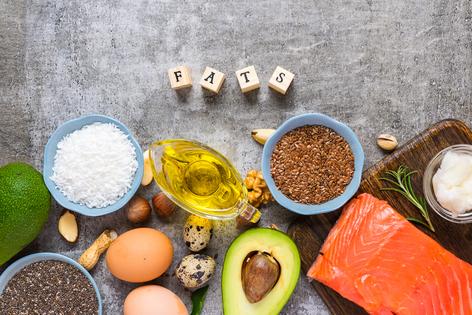Environmental Nutrition: Debunking dietary deceptions: Does eating fat make you fat?
Published in Health & Fitness
There’s a certain logic to the idea that eating high-fat foods — even nutritious foods such as avocados, nuts and olive oil — can lead to weight gain. After all, one gram of fat contains nine calories, while one gram of protein or carbohydrate contains only four calories. But just as science has debunked the idea that weight loss or weight gain is simply the result of “calories in, calories out,” the idea that eating fat automatically leads to eating excess calories, or that dietary fat is directly converted to body fat has been shown to be not entirely correct.
Low-fat origins
The low-fat diet trend of the 1970s to 1990s was largely based on concerns about saturated fats and health. The weight loss industry — including many diet book authors — jumped on that bandwagon, promoting the idea that if you eat as little calorie-dense fat as possible, you can eat a larger volume of food and still lose weight. But instead of replacing saturated fat with healthy poly- and monounsaturated fats or more vegetables, fruits and whole grains, many people started eating more ultraprocessed fat free cookies, crackers and ice cream high in added sugar and refined carbohydrates.
The low-fat tide started to turn in the early 2000s, and more recently it’s become quite clear that dietary fat is compatible with at least short-term weight loss. Take the ketogenic diet — which is high in fat, very low in carbohydrates, and moderate in protein — for example. However, it’s not necessary to switch from one extreme (low fat) to another (high fat). Studies that have compared diets with varying ratios of fat and carbohydrates found that, on average, no single ratio is superior for weight loss or for health. This may be because some individuals respond better to a higher fat diet, and others to a lower fat diet.
The “right kind” of fat matters
Fat is an essential nutrient that, among other things, helps us absorb “fat soluble” vitamins A, D, E and K from food. It’s also clear that including healthy fats in a meal can help you feel full sooner and keep you satisfied longer. “Healthy fat” is the key.
A 2018 Harvard study that looked at more than 20 years of data from almost 300,000 participants in the Nurses Health Studies and the Health Professionals Follow-Up Study found that when people increased saturated and trans fats in their diets, they were more likely to experience weight gain. But when they increased their levels of monounsaturated fats from plant foods and polyunsaturated fats from fish and plant foods, they weren’t likely to gain weight, and some even lost weight. It appears that polyunsaturated fats in particular promote insulin sensitivity, which helps the body use carbohydrates for energy instead of storing it as fat.
The bottom line
Healthy fats have a place in any diet. Foods rich in polyunsaturated fat include fatty or oily fish such as salmon, sardines, anchovies and herring; some nuts and seeds, including walnuts, flaxseeds and sunflower seeds; tofu and soybeans; and vegetable oils such as canola, corn, soybean and sunflower. Foods rich in monounsaturated fats include avocados; peanuts and peanut butter; some nuts and seeds, including almonds, hazelnuts, pecans, pumpkin seeds and sesame seeds; and vegetable oils such as olive, canola, peanut, safflower and sesame.
(Reprinted with permission from Environmental Nutrition, a monthly publication of Belvoir Media Group, LLC. 800-829-5384. www.EnvironmentalNutrition.com.)
©2025 Belvoir Media Group. Distributed by Tribune Content Agency, LLC.










Comments